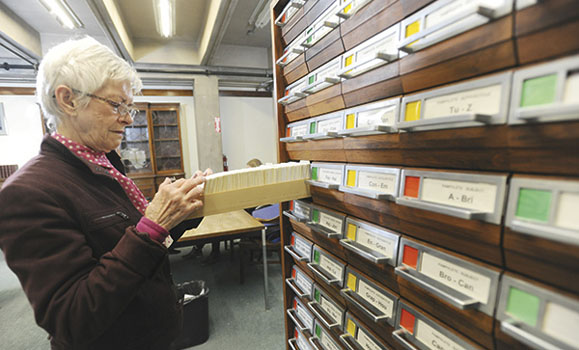Margaret Cameron (BEdŌĆÖ76, MAŌĆÖ79), president of Dalhousie Alumni Association WomenŌĆÖs Division, is self-admittedly curious by nature. ŌĆ£I love to ask questions,ŌĆØ she says with a smile. And it was her curiosity that led to the unravelling of a 100-year-old mystery.
Established in 1909, the WomenŌĆÖs Division has for many years been financially supported by the Emily Bevan Harrington Fund. In 2012, Cameron headed to the Dal archives to find out just who Emily Bevan Harrington was. ŌĆ£I had assumed that she was a wealthy woman who left her estate to Dalhousie,ŌĆØ says Cameron. ŌĆ£I would soon find out that wasnŌĆÖt the case at all.ŌĆØ
Emily Bevan Harrington was one of the first women to come to Dalhousie, beginning her education in 1888, just seven years after Dalhousie opened its doors to women. She would eventually receive a BA in English and her Master of Arts in 1894. Tragically, Emily was plagued by illness and passed away at an early age in 1906, while she was pursuing her doctorate at Dal. A death notice found in the archives describes her as one of DalhousieŌĆÖs most valued members.
As Cameron dug deeper she discovered that EmilyŌĆÖs friends and colleagues started a memorial fund to honour her. A letter sent to other Dalhousians suggested a scholarship supporting women who wanted to further their studies abroad would be the best tribute.

ŌĆ£They had a goal of $5,000 according to the documents,ŌĆØ says Cameron. ŌĆ£I found papers here and there with donations of $2, $5 and so on, raising $500. But then there is a large gap in the records and no indication as to where the funds went.ŌĆØ
As Cameron read on, she connected the dots. In the early 1900s the WomenŌĆÖs Division was advocating for a residence for women students who were away from home studying at Dal. When Shirreff Hall opened its doors in 1923, the WomenŌĆÖs Division helped ensure the residence was kept ŌĆ£gracious and comfortableŌĆØ for women who were calling it their ŌĆ£home away from home.ŌĆØ And while the Emily Bevan Harrington Fund was used for important projects over the last 100 years, it wasnŌĆÖt used for its original intent.
ŌĆ£Now that we had all of this history and knew the money hadnŌĆÖt yet been used for a scholarship the way EmilyŌĆÖs friends wished it to be, we discussed the possibility of using some of the money for a student award.ŌĆØ And that is exactly what Cameron and her fellow executive members did. This fall, the Emily Bevan Harrington Award for International Study will be offered to a female student who will be studying abroad for at least one semester.
ŌĆ£This is really an historical moment,ŌĆØ says Cameron. ŌĆ£It may have taken over a hundred years to support a student with this fund, but weŌĆÖre finally able to make it happen. I think itŌĆÖs a good example of women working together to support other women.ŌĆØ
This article was first published in the spring 2015 issue of .

